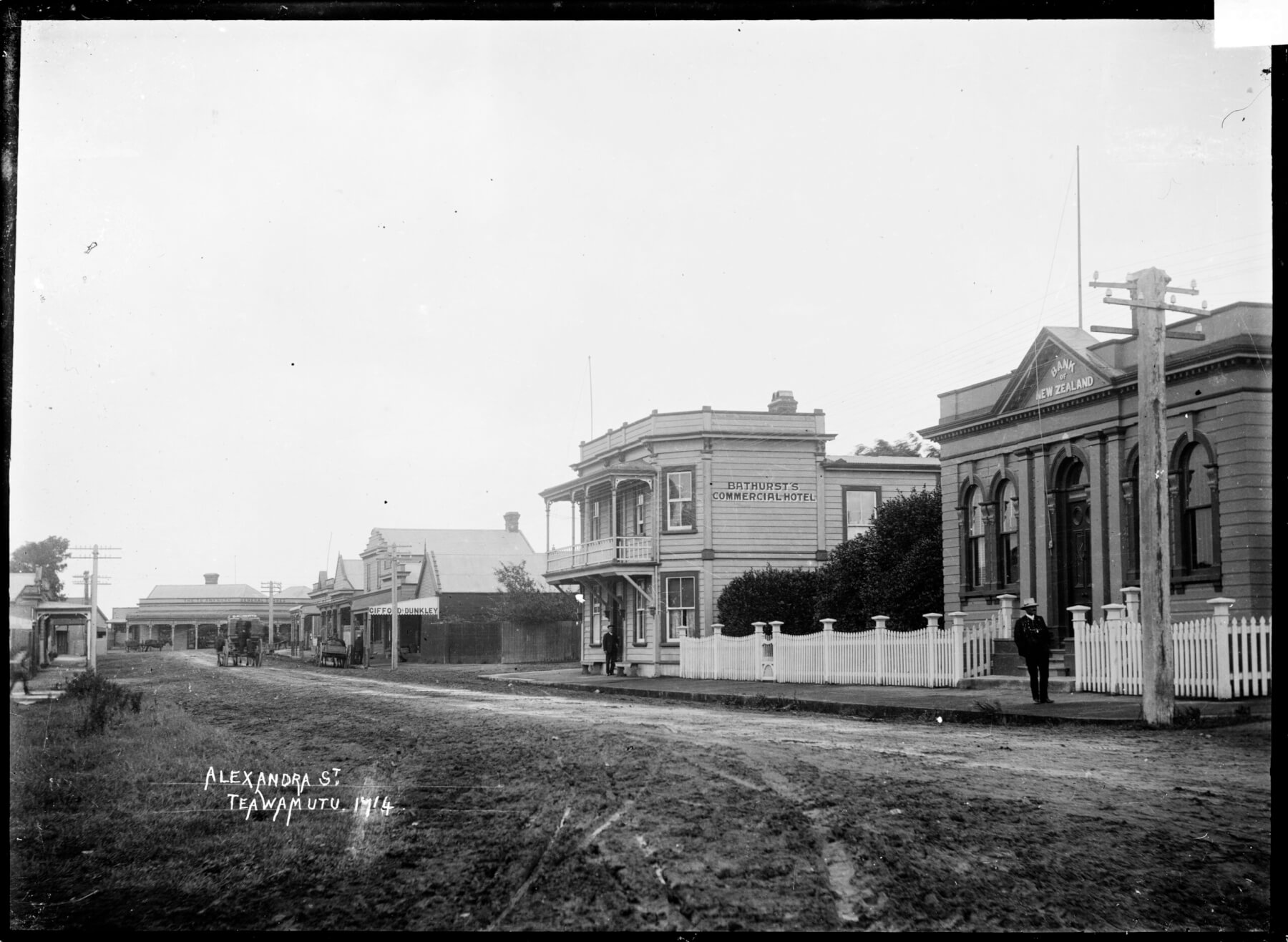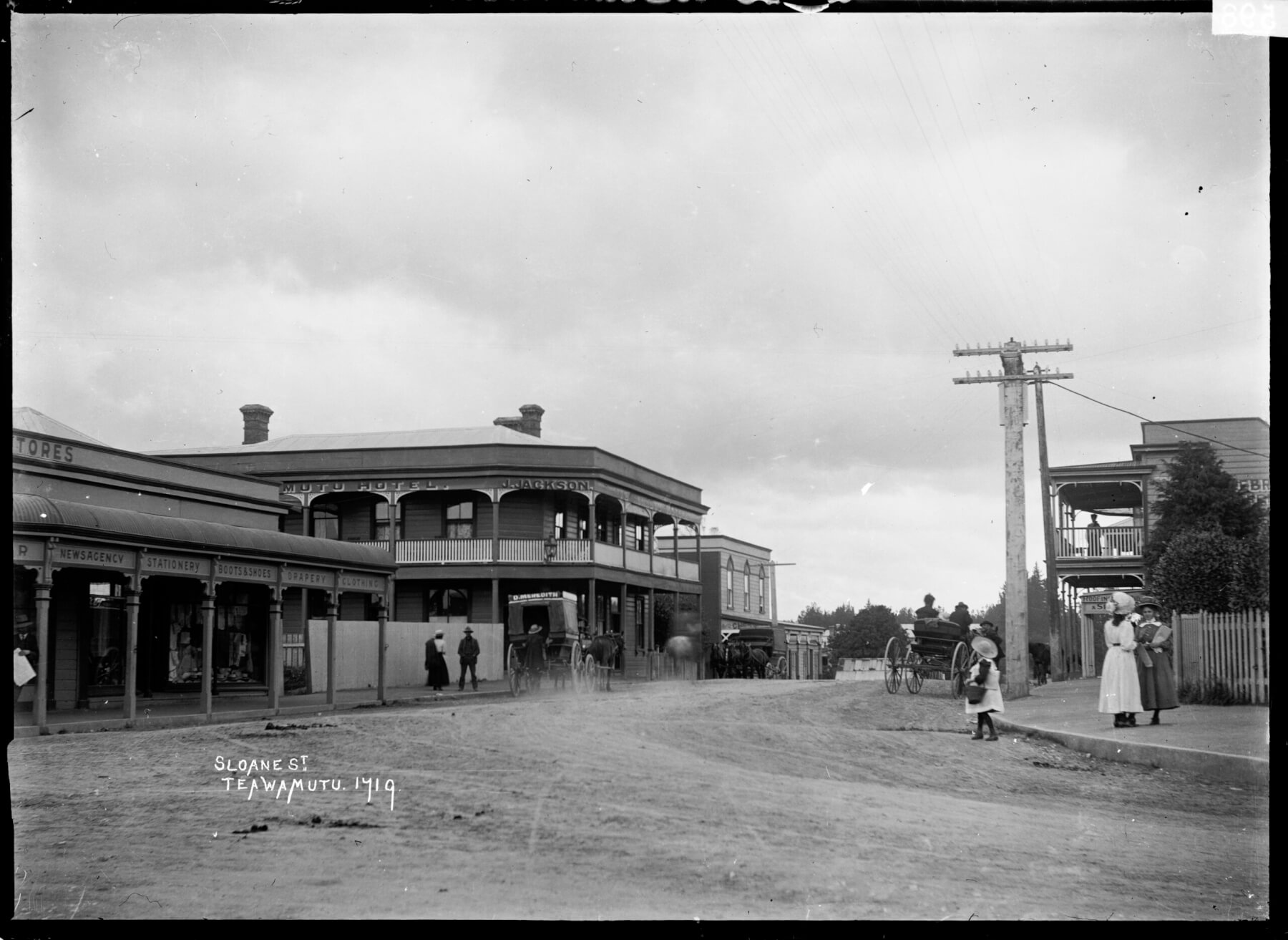
Alexandra Street, Te Awamutu, ca 1910. Price, William Archer, 1866-1948 :Collection of post card negatives. Ref: 1/2-001238-G. Alexander Turnbull Library, Wellington, New Zealand.
William Jones did not want to see a doctor despite his wife, Tema’s, insistence.
The 51 year old Irishman had been in bad health for some time but always refused medical attention. But on this March night in 1909 he was worse than usual and again rejected medical help, saying he would be all right next morning. He went to bed at 9.30 but was in a very bad way. The couple were staying with his wife’s parents, the Turners, at Pirongia and Tema went to get her mother. She was only absent two or three minutes but by the time the women returned William was unconscious. They tried to wake him and get him to speak but he quickly expired.
William had once been a policeman and court clerk in the Te Awamutu district and a no more popular or charitably-inclined officer had been stationed in the area. William had been appointed Constable No. 303 with the Armed Constabulary, the early colonial police force, in June 1878, when he was 21. By 1886 the national New Zealand Police Force had been established as a separate organisation from the military and the genial William was stationed at Alexandra. He immediately distinguished himself by arresting near Otorohangā man who had burgled Mr Hill’s store at Alexandra. It was the first regular arrest in the area and was called a ‘clever capture’. The next year he was promoted for his zeal and promptness in allaying a disturbance between Māori and railway contractors at Otorohangā. By the end of 1887 William was stationed at Te Awamutu – this change being made for economic reasons – William was unmarried and the Government did not have to pay house rent for him as they did for married officers. Eight years later William married Tema Turner and they started a family.
The policeman’s lot in the Te Awamutu district in the late 1800s involved dealing with theft, obscene language, enforcing hotel licensing laws and stopping furious horse riding and larrikinism. William attended Auckland Supreme Court sittings when necessary and the more unpleasant tasks of local deaths and inquests. His work included the extremes of the larceny of two watermelons in 1892 to pitching in in 1894 when the Te Awamutu Town Hall burned down. William saved the courthouse with the help of a bucket brigade. In 1894 he was presented with a Long Service Medal.
Over the next few years his rounds included censuring hoteliers who failed to keep their lamps burning at night and being stationed on the ground at Kihikihi to prevent any serious fracas at a land dispute. In September 1897 he helped Auckland police in the chase, on horseback, of a burglar who was eventually captured in a King Country river standing up to his neck in water. In October William was presented with an award for special services in obtaining convictions for sly-grog selling in the King Country. The next month he dealt with perhaps one of his worst cases – the murder of a Harapepe man over a boundary dispute, and endured a long and rough ride bringing the prisoner back to Te Awamutu.
In 1898, at the age of 40, “our good friend Constable Jones”, whose position was “so long and ably filled” by him was transferred to Auckland where he worked as watch housekeeper. A year later he was discharged from the police on compensation. He took up land at Karamu and worked for many years carving out a home in the wilderness. In 1907, tempted by rising prices, he sold up and moving temporarily to his Pirongia in-laws, until he could purchase another property. But William was noticeably debilitated and he did not live long enough to enjoy his new venture. An inquest found William was somewhat emaciated and his heart was in a deadly state of fatty degeneration.
The policeman who served and protected life in his community resolutely refused to take medical advice for his own life up to the last moment. William is buried at Pirongia cemetery.









